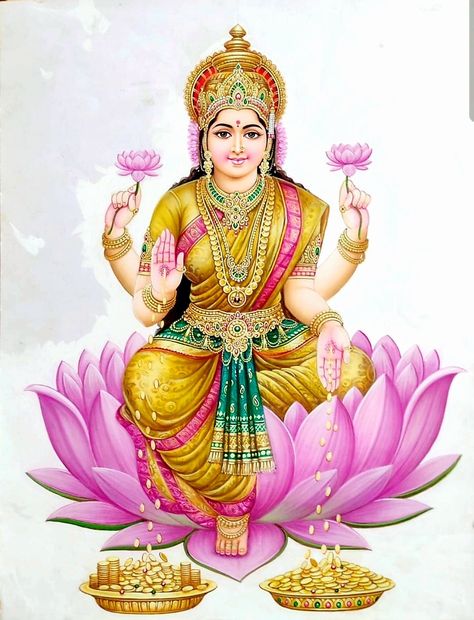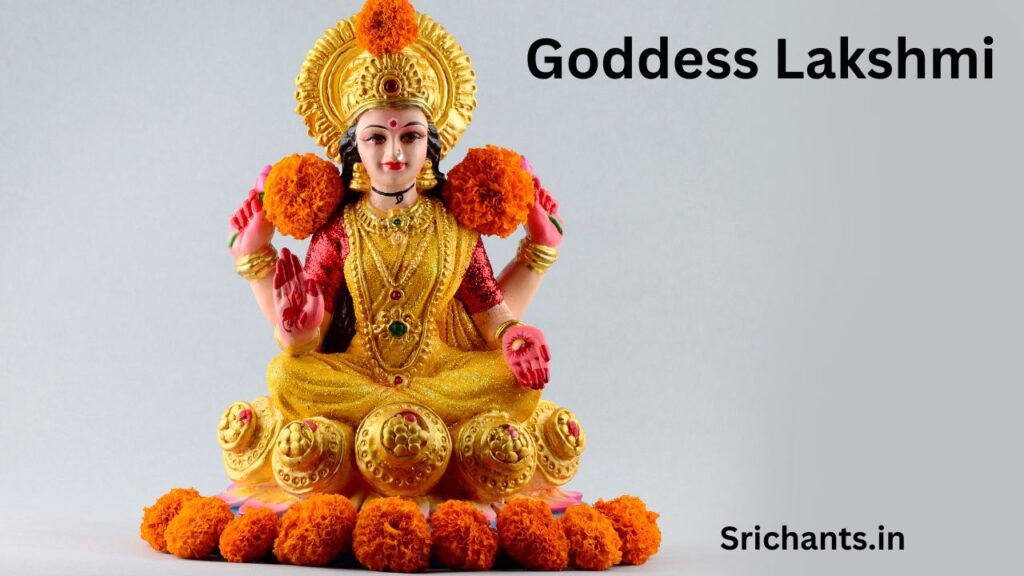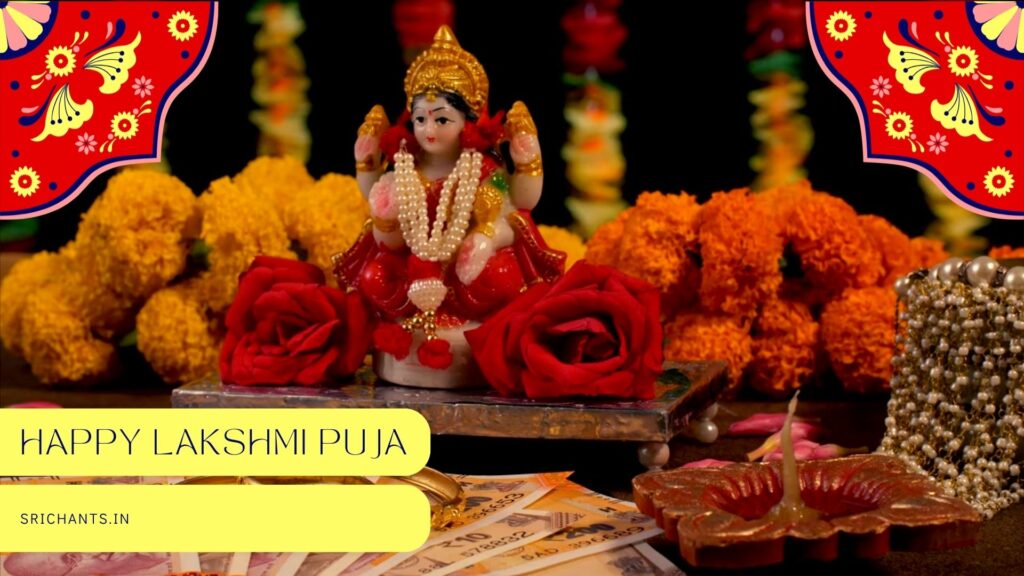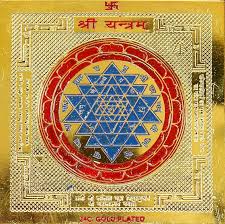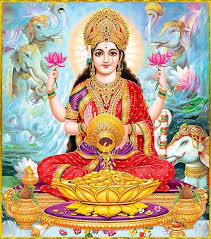Introduction
A long-standing custom with great meaning in Hindu culture is Diwali, the festival of lights. The revered Lakshmi Puja, which brings the Goddess of Wealth and Prosperity into our homes, is at the center of this happy occasion. As we start a new chapter, the Lakshmi Puja is a potent call for prosperity, luck, and health. This thorough book will take you through every step of doing a meaningful Lakshmi Puja at home, regardless of your level of experience with the practice.
Setting up the Sacred Place
Housekeeping and Decorating
The house has to be purified before the fortunate Lakshmi Puja. Diwali morning, clean your home by sprinkling Gangajal, or holy water from the Ganges. To make the house hospitable and colorful for the Goddess, arrange bouquets of marigolds, mango leaves, and banana leaves.
Arranging the Puja Altar
The puja altar should be erected when the sun sets. Select a spotless, raised surface and drape it with new, scarlet cloth. Put a kalash—a water-filled copper or silver pitcher decorated with a betel nut, a marigold flower, a coin, and a little rice—in the middle. Around the kalash, arrange five mango leaves in a fanned-out circle. Top with a little dish or thali that has turmeric on it so you may sketch a lotus flower.
Calling on the Gods
Putting the statues of Goddess Lakshmi and Lord Ganesha on the altar, say a little prayer to Lord Ganesha as you so. Being the remover of impediments, Lord Ganesha is venerated, hence this invocation is essential to a successful and auspicious Lakshmi Puja.
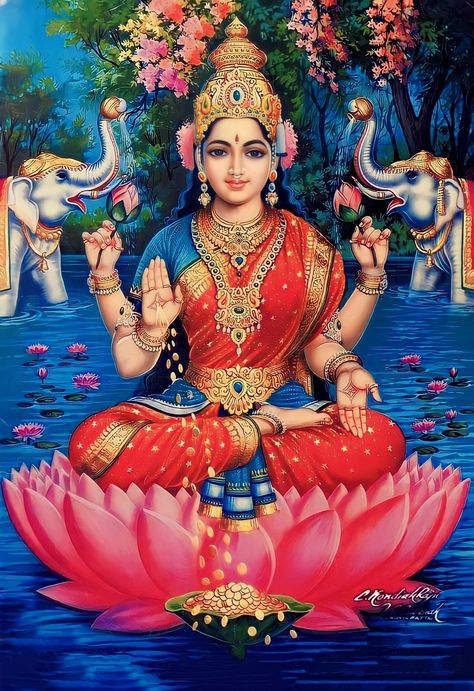
The Customs Around Lakshmi Puja
Dhyana: A Goddess Meditation
Start the puja with a meditation on Goddess Lakshmi’s heavenly form. Imagine her with her wide waist, deep navel, and stunning, enthralling eyes sitting on a lotus flower. See her wearing a beautiful, glittering dress, her hands shaped like lotuses, promising unending wealth.
Manifesting the Goddess with Avahan
Say the Avahan mantra, “Aagachchha Dev-Deveshi!,” to properly invite Goddess Lakshmi to grace your abode. Maha Lakshmi, Tejomayi! Haan Sur-Vandite, Kriyamanam Maya Pujaam!”
Pushpanjali: Seat Offer
Giving Lakshmi five flowers and a seat set with gold and priceless jewels, say, “Nana-Ratna-Samayuktam, Karta-Swar-Vibhushitam.” Hi Dev-Devesh, good morning! Preetyartham Prati -Grihyataam.
Greeting the Goddess with Swagat
Offer the Goddess a cordial welcome with folded hands: “Shri Lakshmi-Devi! Swagatam.”
Foot Washing, or Padya
Chanting, ‘Padyam Grihaan Deveshi, Sarva-Kshema-Samarthe, Bhoh!’ offer water to wash the Goddess’s feet. Devi Bhaktya Samarpitam, Maha-Lakshmi! Namoastu Te.
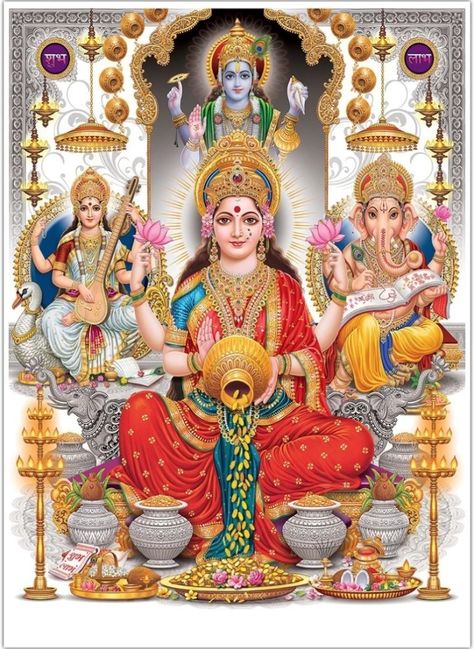
Water Offering for Abhishekam by Arghya
Giving the Goddess’s head Abhishekam water, say, “Namaste Dev-Deveshi! Hi Kamal-Dharini! Dhanada-Devi, Shri Maha-Lakshmi, Namaste! By Arghyam Grihaan.
Swimming with the Goddess, Snana
Chanting, “Gangasaraswatirevapayoshninarmadajalaih,” offer the Goddess a cleansing bath made with water from the Ganges, Saraswati, and Narmada rivers. Me Snapitasi Maya Devi Tatha Shantim Kurushva.”
The Five Nectar Bath by Panchamrita Snana
Reciting, “Dadhi Madhu Ghratashchaiva Payashcha Sharkarayutam,” bathe the Goddess in the lucky Panchamrita, a concoction of yogurt, honey, ghee, milk, and sugar. Samanitam Panchamritam Snanartham Pratigrihyatam.”
The Scented Bath, Gandha Snana
Using fragrant sandalwood paste, anoint the Goddess while reciting, “Om Malayachalasambhutam Chandanagarusambhavam. Chandanam Devadeveshi Snanartham Pratigrihyatam.”
The Pure Water Bath, Shuddha Snana
Reciting “Mandakinyastu Yadvari Sarvapapaharam Shubham,” offer the Goddess a pure water bath to end the bathing procedures. Tadidam Pratigrihyatam Snanartham Tubhyam.”
Offering New Clothing
As you give the Goddess a fresh, heavenly garment, say, “Divyambaram Nutanam Hi Kshaumam Tvatimanoharam. Diyamanam Maya Devi Grihana Jagadambike.”
Offers Milk and Honey, Madhuparka
Offering the Goddess a concoction of milk, curd, and honey, recite “Om Kapilam Dadhi Kundendudhavalam Madhusamyutam. Grihana Bhoh, Swarnapatrasthitam Devi, Madhuparkam.”
Abhushana: Dressing the Goddess
Adorn the Goddess with exquisite jewelry, wishing to purge any sins: “Ratnakankada Vaiduryamuktaharayutani Cha.” Suprasannena Swikurushwa Me Manasa Dattani.”
Raktachandana: Presenting Sandalwood
Say, “Om Raktachandanasammishram Parijatasamudbhavam Maya Dattam Grihanashu Chandanam Gandhasamyutam,” while offering the Goddess scented red sandalwood.
Applying Vermilion, Sindoor
Chanting, “Om Sinduram Raktavarnashcha Sinduratilakapriye,” offer the auspicious vermilion, a sign of marital happiness and wealth. Maya Devi Sinduram Pratigrihyatam, Bhaktya Dattam.”
Kumkuma: Towards Saffron
Dress the Goddess in the hallowed saffron, which symbolizes Akhand Saubhagya, or unbroken good fortune, and say, “Om Kumkumam Kamadam Divyam Kumkumam Kamarupinam. Pratigrihyatam Kumkumam Akhandakamasaubhagyam.”
Abira-Gulala: Offering Colors of Good Fortune
Chanting, “Abirashcha Gulalam Cha Chova-Chandanameva Cha,” offer the Goddess the vivid powders of Abira (vermilion) and Gulala (colored). Shringarartham Maya Dattam Grihana Parameshwari.”
Offering Scented Oils is Sugandhita Dravya.
Chant “Om Tailani Cha Sugandhini Dravyani Vividhani Cha” while you offer the Goddess several aromatic oils and essences for anointing. Lepartham Grihana Parameshwari, Maya Dattani.”
Offering Broken Rice is Akshata.
Offering the Goddess whole, turmeric-coated rice grains, a sign of good fortune, chant “Akshatashcha Surashreshtha Kumkumaktah Sushobhitah.” Maya Pratigrihyatam, Maya Nivedita Bhaktya Pujartham.”
Offer Sandalwood Paste at Gandha-Samarpan
Offering the Goddess a fragrant paste of sandalwood, invoke “Shri-Khanda-Chandanam Divyam, Gandhaadayam Sumanoharam”. Mahalakshmi Vilepanam! Chandanam Prati-Grihyata.
Offer Flowers, Pushpa-Samarpan
Offering the Goddess seasonal flowers, Vilva leaves, and Tulsi leaves, chant “Yatha-Prapta-Ritu-Pushpaih, Vilva-Tulasi-Dalaishcha!” Pujayaami, Maha-Lakshmi! Me Sureshwari, Prasida!”
Worshiping the Body Parts of the Goddess, or Anga-Pujan
Using offerings of Gandha, Akshata, and Pushpa, honor the Goddess’s many body parts, including her feet, knees, waist, navel, and more.
Ashta-Siddhi Puja: Honoring the Eight Elemental Forces
Offer respect to Anima, Mahima, Garima, Laghima, Prapti, Prakamya, Ishita, and Vashita to invoke the Ashta-Siddhi, or eight magical abilities.
Ashta-Lakshmi Puja: Honoring the Eight Manifestations of Lakshmi
Adya-Lakshmi, Vidya-Lakshmi, Saubhagya-Lakshmi, Amrit-Lakshmi, Kamalakshi, Satya-Lakshmi, Bhoga-Lakshmi, Yoga-Lakshmi are the eight Goddess incarnations honored during the Ashta-Lakshmi Puja.

At the end of the Puja
Offer Incense at Dhoop-Samarpan
Chanting, “Vanaspati-Rasodbhuto Gandhaadhyah Sumanoharah,” offer the Goddess the aromatic incense. Aaghreyah Sarva-Devanaam; Dhupoayam Prati-Grihyataam.”
The Lamp Offering in Deep-Samarpan
Offer the Goddess the lit lamp and say, “Sajyam Varti-Sanyuktam Cha, Vahnina Yojitam Mayaa, Deepam Grihaan Deveshi! Timirapaham Trailokya.”
Offering Delights in Naivedhya-Samarpan
Offer the Goddess a range of sweets, savouries, and other delicious things while chanting, “Sharkara-Khanda-Khadyaani, Dadhi-Ksheera-Ghritaani Cha. Aaharo Bhojyam Cha, Naivedhyam Prati, Grihyataam.”
Achamana-Samarpan: Dwelling on Water
Reciting the suitable mantras, offer Achamana (sipping) the Goddess water to wipe her hands and face.
Offers Nuts with Betel Leaves Tambool-Samarpan
Offering the Goddess a Tambool, a delicious dish of betel leaves and almonds, chant “Poogi-Phalam Maha-Divyam, Naga-Valli-Dalairyutam.” Karpurailaa-Grihyataam, Tamboolam Prati-Samayuktam.”
Dakshina: Presenting a Gift
Giving the Goddess a gift—like a Champak flower packed with gold—recite: “Hiranya-Garbha-Garbhastham, Hema-Veejam Vibhaavasoh. Prayachchha Me Ananta-Punya-Phaladamatah Shantim.”
Pradakshina: Approaching the Goddess
Circumambulate the Goddess, or Pradakshina, asking for her pardon for any errors and calling out her blessings: “Yani Yani Cha Papani, Janmantar-Kritani Cha. Tani Tani Vinashyanti, Pade Pade, Pradakshinam.”
Vandana-Sahit Pushpanjali: Respectful Flower Offering
Chant a prayer of adoration and offer flowers to the Goddess: “Kar-Kritam Vaa Kayajam Karmajam Vaa, Shravan-Nayanajam Vaa Manasam Vaaparadham. Viditamaviditam Vaa; Sarvametat Kshamasva; Jaya Jaya Karunaabdhe; Shri Maha-Lakshmi Trahi.”
Ashtanga-Pranam: Taking Possession of the Goddess
Get the Goddess Lakshmi to bless you with Sashtanga Pranam, the eight-limbed prostration: “Om Bhavani! Tvam Sarva-Kaam-Pradayini. To Prasannaa Santushtha Bhava Devi! Asante Te.
Kshama-Prarthana: Seeking Forgiveness
End the puja by pleading with the Goddess for any errors or omissions made during the rite: “Avahana Na janami, Na Janami Visarjanam. Puja-Karma Na Janami, Kshamasva Parameshwari.
Conclusion
A deep and complex rite, Lakshmi Puja calls forth the favor of the Goddess of Prosperity and Wealth. This thorough manual will help you to organize a meaningful and auspicious Lakshmi Puja in the convenience of your own home. May Goddess Lakshmi’s heavenly grace bring you success, plenty, and eternal happiness as you participate in this holy ritual.
#lakshmipuja #puja #home #maalakshmi #lakshmi #goddess #goddesslakshmi
